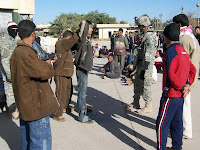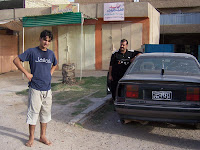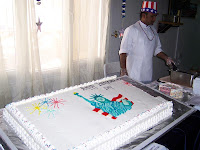Sometimes things happen in war that no amount of training can adequately prepare you for. We were infiltrated. I don't know when it happened. I don't know how long the enemy conducted surveillance before making his move. It is disturbing that he was able to get so close to me before he was identified. A fellow soldier stopped by my door to discuss an upcoming mission, and it was he who alerted me to the interloper in our midst. "Dude. You've got a mouse." So began an epic - and lethal - battle of wits;
mono y mono.

I took an initial inventory of assets at my disposal with which I planned to dispatch my adversary. I immediately dismissed my M-4 rifle, and my M-9 Beretta pistol. Not only would their usage violate the principles of proportionality, but the disciplinary consequences resulting from discharging either weapon in my own room were compelling disincentives. Then my eyes fell upon a toy pellet gun confiscated from a Baghdad market (see the photograph from the October 6 posting on this blog). As the weapon in question is sufficiently powerful to put a hole in an empty Coke can, but silent enough to escape the notice of my chain of command, It appeared the ideal tool.
I perched on my bed with the plastic rifle aimed at a Cheese Nip cracker near the baseboard across the room, and I waited. ..and waited. An electronic bong sound emanated from my laptop computer indicating in incoming email. I turned to identify the sender, and in that brief split-second, the Cheese Nip vanished. Out of frustration I began pulling gear from beneath the bunks, shaking out bags, dragging wall lockers into the middle of the room. I listened intently for the tell-tale sounds of miniature incisors masticating baked crispy snacks. Finally, my piqued ears detect movement from beneath or within Bob's wall locker. I very carefully arranged boxes of soup cans and energy drinks to create a "fatal funnel" through which my foe would have to traverse in order to procure yet another strategically placed Cheese Nip. Again, I wait.
Nothing.
By this time, it was after 1 AM. My sleep deprived brain had reached a point where I was quite simply unable to focus. Even if I did get the creature in my sights, I had no confidence in my ability to hold steady my weapon. I decided on a tactical retreat. Morning would mean a trip to the PX, and an escalation of force: Mouse traps! I shut off the lights and crawled into bed. Alas, my nemesis had other plans.
Just as I was drifting to sleep, I sensed something moving through my hair. The mouse was on my head!! I leapt to my feet, frantically sweeping my scalp with my hands. The mouse jumped to my bed, scurried to the end, bounded to the floor, and disappeared into the rucksacks and duffels piled in the middle of the floor. Sleep was now out of the question. I got to work.
I constructed an elaborate trap using two Cheese Nips, a daub of peanut butter, a piece of string, a Priority Mail box, a can of chili, and a cleaning rod from a gun cleaning kit. It was brilliant! The crackers and peanut butter were attached to the string which was tied around one end of the cleaning rod, which propped up the box. The chili added weight to the box. If the mouse tugged the string, it would dislodge the rod, and bring down the box upon him. For good measure, I loaded the pellet gun and tucked it next to me as I climbed back into bed. Again, I waited.
I saw him out of the corner of my eye as I was answering an email. Such a subtle movement, and oh so silent. There he was...tugging on the cracker attached to the string. But he wasn't strong enough to dislodge the cleaning rod! I slowly raised my rifle, brought the preoccupied rodent into my sights, and gently squeezed the trigger. A plastic
Thwack! immediately preceded an aspirated mouse-sized squeak as the creature took a direct hit to his side, flipped over and began kicking wildly at the air. It was a miraculous shot! One in a million! I was exhalant! But before I could cross the room to administer the
coup de grace, the animal righted himself and beat a hasty retreat from the battlefield. I couldn't believe it! What was this creature made of that it could withstand such an assault that could puncture a soda can!

There was little more that I could do. He was to make neither another appearance, nor a sound for the rest of the night. The next morning I journeyed to the PX and purchased mouse traps. I could only hope that I had not dealt a mortal blow, and that he did not seek refuge in some dark corner of my gear only to die there. It could be days before the smell confirmed that fate. I set the traps, and my team and I departed for several days outside the wire.
Upon my return, my victory was confirmed. He lay stiff beneath a sprung overturned trap, his dried blood splashed upon the baseboard.
"The art of war is simple enough. Find out where your enemy is. Get at him as soon as you can. Strike at him as hard as you can and as often as you can, and keep moving on."- Ulysses S. Grant
 Rumors started to move through the crowd even before we entered the building. Once inside, they were confirmed. High winds in Tikrit had grounded the helicopters, and the show was canceled. Instead, we were greeted to a ten minute "pep talk" by the Chairman of the Joint Chiefs of Staff, Admiral Mullen, who reassured us that he received briefings on what was going on in Iraq. Really. He then proceeded to distribute commemorative coins, shake hands, and have his photo snapped with anybody who wished it. Bob and I received coins, but we were rushed through so rapidly, that we were unable to get photos with the Admiral.
Rumors started to move through the crowd even before we entered the building. Once inside, they were confirmed. High winds in Tikrit had grounded the helicopters, and the show was canceled. Instead, we were greeted to a ten minute "pep talk" by the Chairman of the Joint Chiefs of Staff, Admiral Mullen, who reassured us that he received briefings on what was going on in Iraq. Really. He then proceeded to distribute commemorative coins, shake hands, and have his photo snapped with anybody who wished it. Bob and I received coins, but we were rushed through so rapidly, that we were unable to get photos with the Admiral. It is now Christmas day. The dining facilities on base are packed with soldiers taking advantage of an extravagant Christmas dinner with all the trimmings. Rather than deal with the huge lines, our detachment opted to ante up, and one of our interpreters arranged to bring in a positively massive authentic Iraqi feast from one of Baghdad's finer restaurants. The quantity and variety of delectables was mind-boggling. All manner of meats and vegetables, rice, soups, sauces, and breads, were followed by a selection of sweet desserts. It was enough, even for a short while, to relieve the ache of being so far from home and loved ones.
It is now Christmas day. The dining facilities on base are packed with soldiers taking advantage of an extravagant Christmas dinner with all the trimmings. Rather than deal with the huge lines, our detachment opted to ante up, and one of our interpreters arranged to bring in a positively massive authentic Iraqi feast from one of Baghdad's finer restaurants. The quantity and variety of delectables was mind-boggling. All manner of meats and vegetables, rice, soups, sauces, and breads, were followed by a selection of sweet desserts. It was enough, even for a short while, to relieve the ache of being so far from home and loved ones.





















 I know, I know... The similarities are eerie.
I know, I know... The similarities are eerie. 










